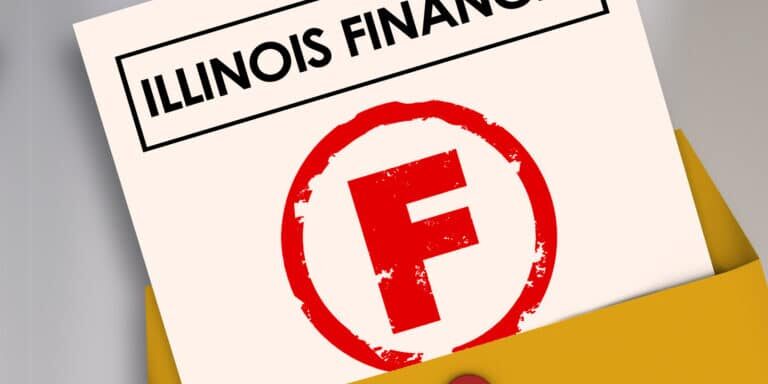
Illinois Government Fails - Who's Next?
The state of Illinois is now careening toward a massive financial derailment.
To say that Illinois is in dire financial straits would be an understatement. It has a backlog of unpaid bills surpassing $15 billion. Its unfunded pension obligations amount to around $130 billion. Its credit rating has been severely downgraded by Moody’s and Standard & Poor’s to that of junk-bond status. And its interest payments for borrowing have been driven up significantly.
In short, the Land of Lincoln has entered the late stages of a terminal condition from which it may not be able to find its way out, save for declaring bankruptcy. A slow motion train wreck years in the making, current news headlines now accentuate the deathwatch:
Could roadwork stop Friday if Illinois doesn't pass a budget?
(Daily Herald) - Dire warnings are emanating from all corners of Illinois that if Gov. Bruce Rauner and Democratic lawmakers don't pass a budget this week, the 2017 construction season will become collateral damage and all state roadwork will cease as of Friday afternoon.
"I'm very pessimistic," said Martam Construction President Robert Kutrovatz. "Personally, I think we're going to have to shut it down. There are too many political games going on." A work stoppage would silence cement mixers at sites from the Jane Byrne Interchange to Route 132 in Gurnee, cut jobs and cost the state millions.
Illinois careens into financial meltdown – and not even the lottery is safe
(Fox News) - Illinois is grappling with a full-fledged financial crisis and not even the lottery is safe – with Republican Gov. Bruce Rauner warning the state is entering "banana republic" territory.
Just last week, the Illinois comptroller, who is responsible for paying the state’s bills, warned the office would be paying out 100 percent of Illinois’ monthly revenue, leaving negative funds for “discretionary spending. ”
Could Illinois be the first state to file for bankruptcy?
(CBSNews) A financial crunch is spiraling into a serious problem for Illinois lawmakers, prompting some observers to wonder if the state might make history by becoming the first to go bankrupt.
Ratings agency Moody's Investor Service earlier this month downgraded Illinois' general obligation bonds to its lowest investment grade rating, citing the state's growing pile of unpaid bills and its mounting pension deficit.
Illinois, by the way, has the lowest credit rating of any state. Lower ratings mean higher borrowing costs, since lenders view such borrowers as riskier bets.
As noted by the Fiscal Times, Illinois is the only state that's been operating without a balanced and complete budget for almost two years.
How did Illinois manage to self-destruct so extensively and at such an extremely slow pace?
According to an analysis done by Thomas Walstrum, a business economist for the Chicago Federal reserve, the reason for the catastrophe is both simple and underwhelming, the crux of the issue having to do with the way the state (mis)calculated the future implications of its pension obligations.
Here’s the gist. Illinois was considered both a low-revenue and low-expenditure state as compared with US state averages. Based on data compiled from just before 1990 to 2016, crunching the numbers would have confirmed this status. However, the figures left out an important piece of data--pension liabilities. Walstrum simply recalculated the figures, this time taking into account the state’s pension liabilities, upon which he uncovered a sobering perspective: state spending was much closer to the US average than previously thought.
In terms of revenue, the gap between Illinois’ revenue and that of the US state average had barely narrowed, showing that Illinois had remained a low-revenue state throughout the 26-year period of the study.
But the distressing revelation appears when the new expenditure and revenue figures (including pension liabilities) are combined. The new calculations show that just before 1990, Illinois had already been spending more than 100% of its revenues--a figure that increased to over 180% during the housing crisis!
Such a sobering analysis can only affirm Illinois’ Gov. Rauner’s statement: “We’re like a banana republic. We can’t manage our money.” Furthermore, Rauner warns that the state may no longer be in a position to guarantee “timely and predictable payments” for a number of core services. Bankruptcy may be the only way out.
But is it even possible for a state to file for bankruptcy?
Federal government bankruptcy code allows individuals, corporations, school districts, towns, cities, and counties to file for bankruptcy. But current law does not allow states to file for bankruptcy...at least not yet. Congress would have to get involved, and there isn’t an easy way to determine how long such a process might take.
Although states cannot file for bankruptcy, they are able to borrow money at much lower interest rates. The assumption here is that lenders trust that states will find a way to pay back their debts. But looking at Illinois’ history of fiscal mismanagement, it seems as if neither the probabilities nor probable payoffs would be favorable enough to outweigh the risks. We’ll find out what happens soon enough, as Illinois is quickly approaching its third fiscal year without an operating budget.
Illinois is not the only state experiencing financial woes.
Illinois’ financial troubles are in part due to the fact that its state constitution doesn’t allow it to reduce pension payments. As for other states, differences in state constitutions, contract and labor laws, and other variables make it difficult to conduct such a clear assessment. Although certain states may appear similar in terms of financial circumstances, variations in constitution and laws may give some states more flexibility than others in developing their own solutions.
So what other states might be in a position to cut government services or raise taxes? The Governing Institute published a report last year which analyzed studies conducted by J.P. Morgan, PricewaterhouseCoopers, and the Mercatus Center of George Mason University. According to the report, both J.P Morgan and PricewaterhouseCoopers identified Connecticut, Illinois, Kentucky and New Jersey as states suffering from poor fiscal health. The Mercatus Center added Massachusetts to the list.
When weaker states fail, how will the Federal government and other solvent states respond?
If failed states are bailed out by stronger governments, might that not decimate the balance sheets of the latter? But if failing states are allowed to default, might that not have a devastating impact on the entire banking system...perhaps on a global scale?












